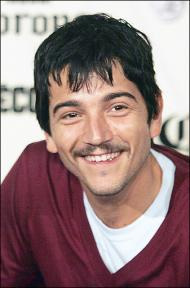
|
 |
 |
 Entertainment | January 2008 Entertainment | January 2008  
Latin America Filmmakers Huddle for Warmth at Snowy Sundance
 Agence France-Presse Agence France-Presse
go to original


| | Diego Luna (AFP) | | |
Park City, Utah — Now is a great time to be an independent filmmaker in Latin America, according to Mexican actor Diego Luna, but oddly, he lamented, they too often have to come to the United States to succeed, and even to meet.

Luna, a juror in the dramatic category at the 2008 Sundance Film Festival here, told reporters he has become friends with several filmmakers from all over Central and South America that he met here in the snowy canyons of Utah.

He praised US audiences' huge appetite for independent films for helping to finance many more Latin American film projects of late, but added: "It's strange that we had to come north to meet each other."

"In poor countries, there are lots of stories to be told," he said, pointing to a new generation of filmmakers in his homeland who grew up in the aftermath of the 1985 Mexico City earthquake - one of the most devastating tremors in the history of the Americas - eager to tell them.

"It shook us and woke us up, faster than my father's generation," he said, noting that most great filmmakers in his birth country of late are under 40 years old, and many are in their 20s.

"It's a new world open to new stories," he said. "And it's a good time to be an independent filmmaker."

There are 17 films from Latin America being screened this year at the festival.

Colombia and Panama are making their debut at Sundance with director Carlos Moreno's "Perro Come Perro" (Dog Eat Dog) set in the Colombian crime world, and the coming of age story "Burgua dii Ebo" (The Wind and the Water) by Vero Bollow and the Igar Yala Collective.

Others include Ricardo de Montreuil's road movie "Mancora" co-produced by Spain and Peru, and Ernesto Contreras's "Parpados Azules" (Blue Eyelids), which will be released next month in Mexico.

As well, there are several films about South America being screened here this year.

A documentary from France, "Stranded: I've Come From a Plane That Crashed on the Mountains," retells one of the greatest survival stories of all time (in Spanish with English subtitles), about a Uruguay rugby team that boarded a plane in October 1972 for a match they would never play.

Their plane crashed in the Andes, but miraculously, 16 of the 45 passengers managed to stay alive on a frozen glacier for 72 days.

Canadian film "Les Femmes de la Brukman" (The Women of Brukman) follows the struggles of women workers in Argentina to reopen a men's suit factory after the owner disappears in the wake of a national economic meltdown.

In 2006, Diego Luna first appeared at Sundance in Carlos Balado's "Solo Dios Sabe" and returned last year with "The Night Buffalo" (El Bufalo de la Noche), directed by Jorge Hernandez Aldana Luna.

Diego also starred in the 2001 Oscar-nominated "Y Tu Mama Tambien" with his friend Gael Garcia Bernal, directed by Alfonso Cuaron.

But despite his sense of fraternity with fellow Spanish speakers, he commented: "To have a Latino point of view (in the United States) is not easy. You're first a human being before you're issued a passport." | 
 | |
 |



